International Business and Communication: A Case Study of Unilever's Expansion in Syria
VerifiedAdded on 2023/06/18
|11
|3315
|70
AI Summary
This case study discusses Unilever's plan to expand its business in Syria and the communicational barriers faced by foreign businesses. It applies Hofstede's cultural dimensions model to understand cultural differences and evaluates cultural sensitivity while doing international business. It also recommends appropriate communicational strategies for successful international business.
Contribute Materials
Your contribution can guide someone’s learning journey. Share your
documents today.
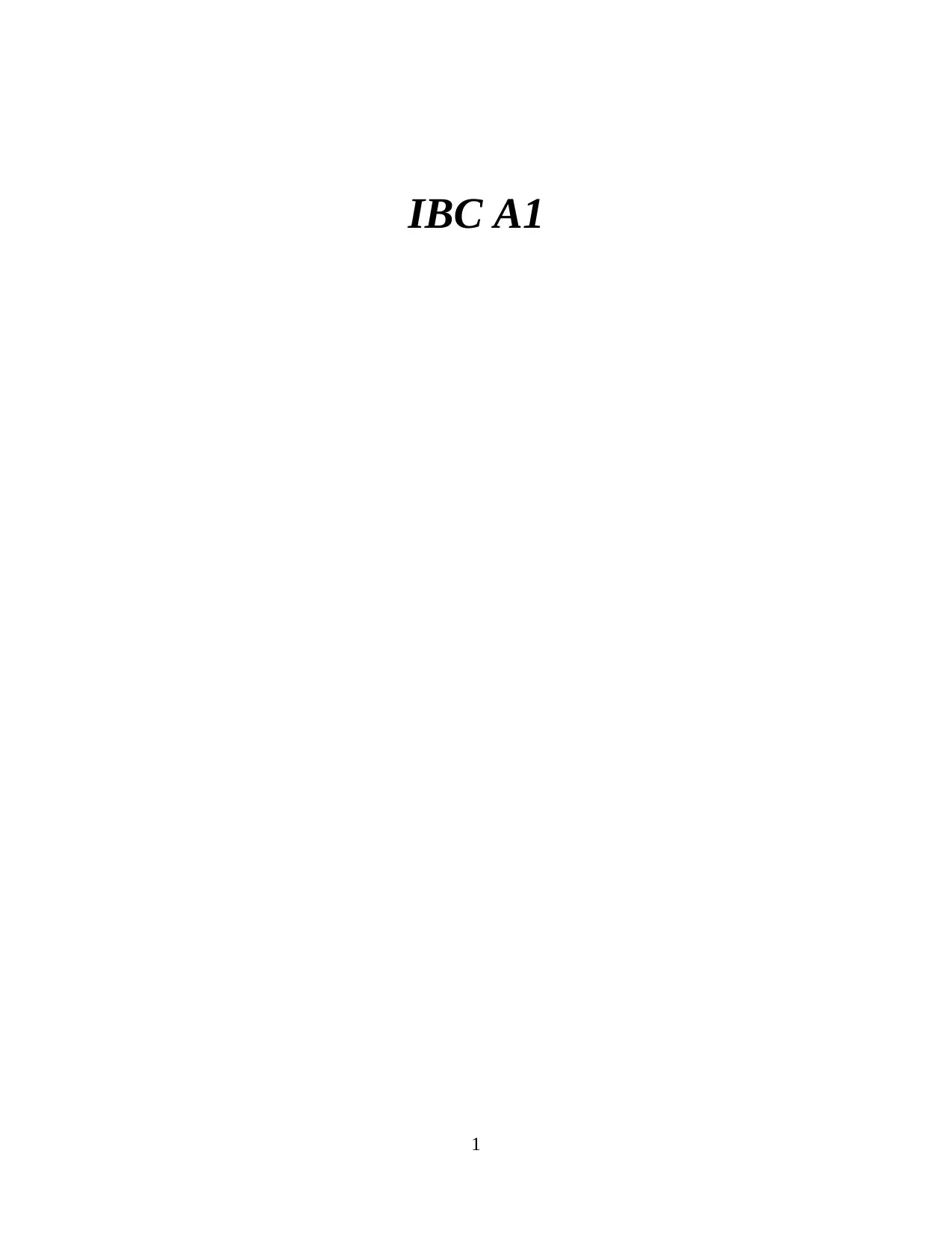
IBC A1
1
1
Secure Best Marks with AI Grader
Need help grading? Try our AI Grader for instant feedback on your assignments.
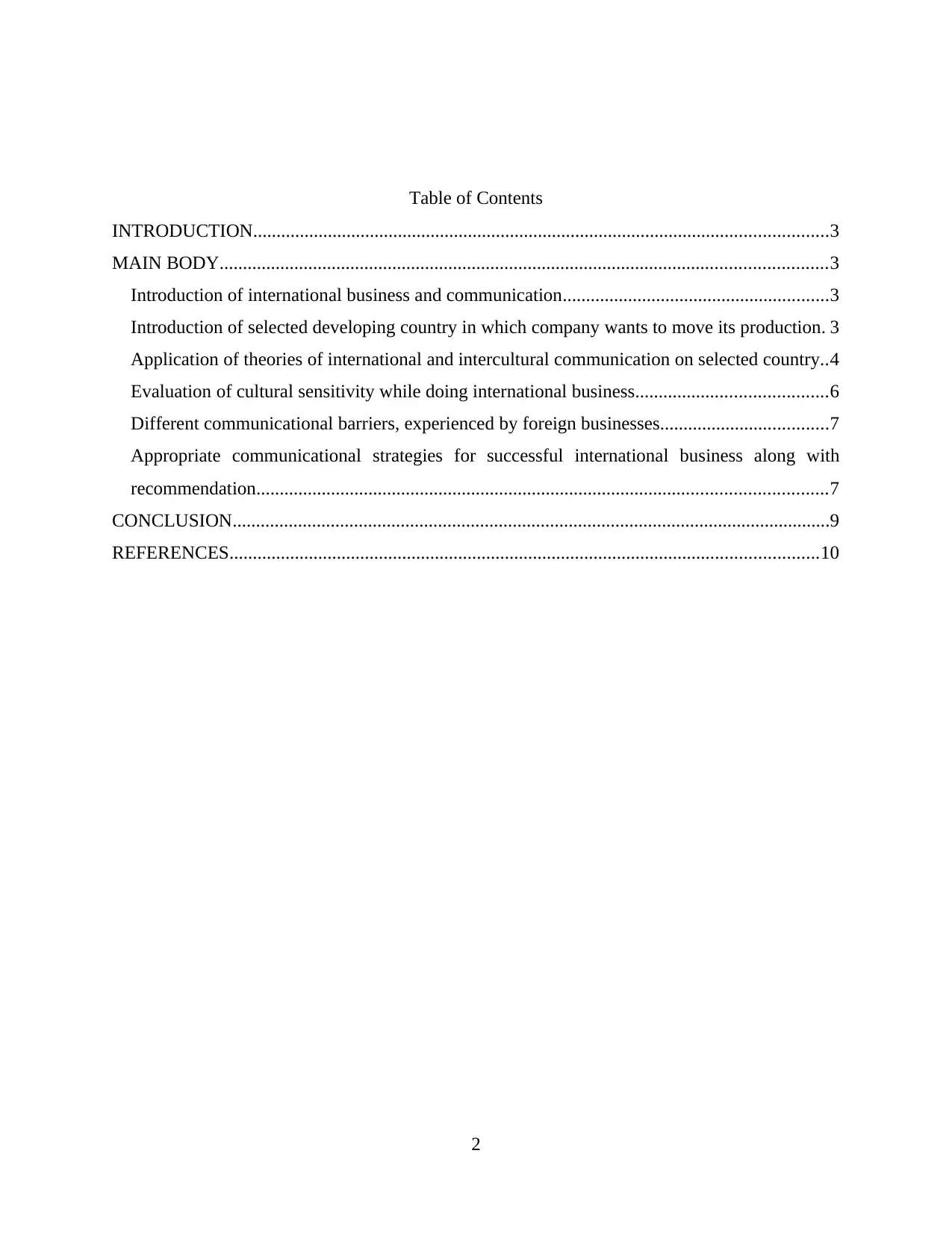
Table of Contents
INTRODUCTION...........................................................................................................................3
MAIN BODY..................................................................................................................................3
Introduction of international business and communication.........................................................3
Introduction of selected developing country in which company wants to move its production. 3
Application of theories of international and intercultural communication on selected country..4
Evaluation of cultural sensitivity while doing international business.........................................6
Different communicational barriers, experienced by foreign businesses....................................7
Appropriate communicational strategies for successful international business along with
recommendation..........................................................................................................................7
CONCLUSION................................................................................................................................9
REFERENCES..............................................................................................................................10
2
INTRODUCTION...........................................................................................................................3
MAIN BODY..................................................................................................................................3
Introduction of international business and communication.........................................................3
Introduction of selected developing country in which company wants to move its production. 3
Application of theories of international and intercultural communication on selected country..4
Evaluation of cultural sensitivity while doing international business.........................................6
Different communicational barriers, experienced by foreign businesses....................................7
Appropriate communicational strategies for successful international business along with
recommendation..........................................................................................................................7
CONCLUSION................................................................................................................................9
REFERENCES..............................................................................................................................10
2
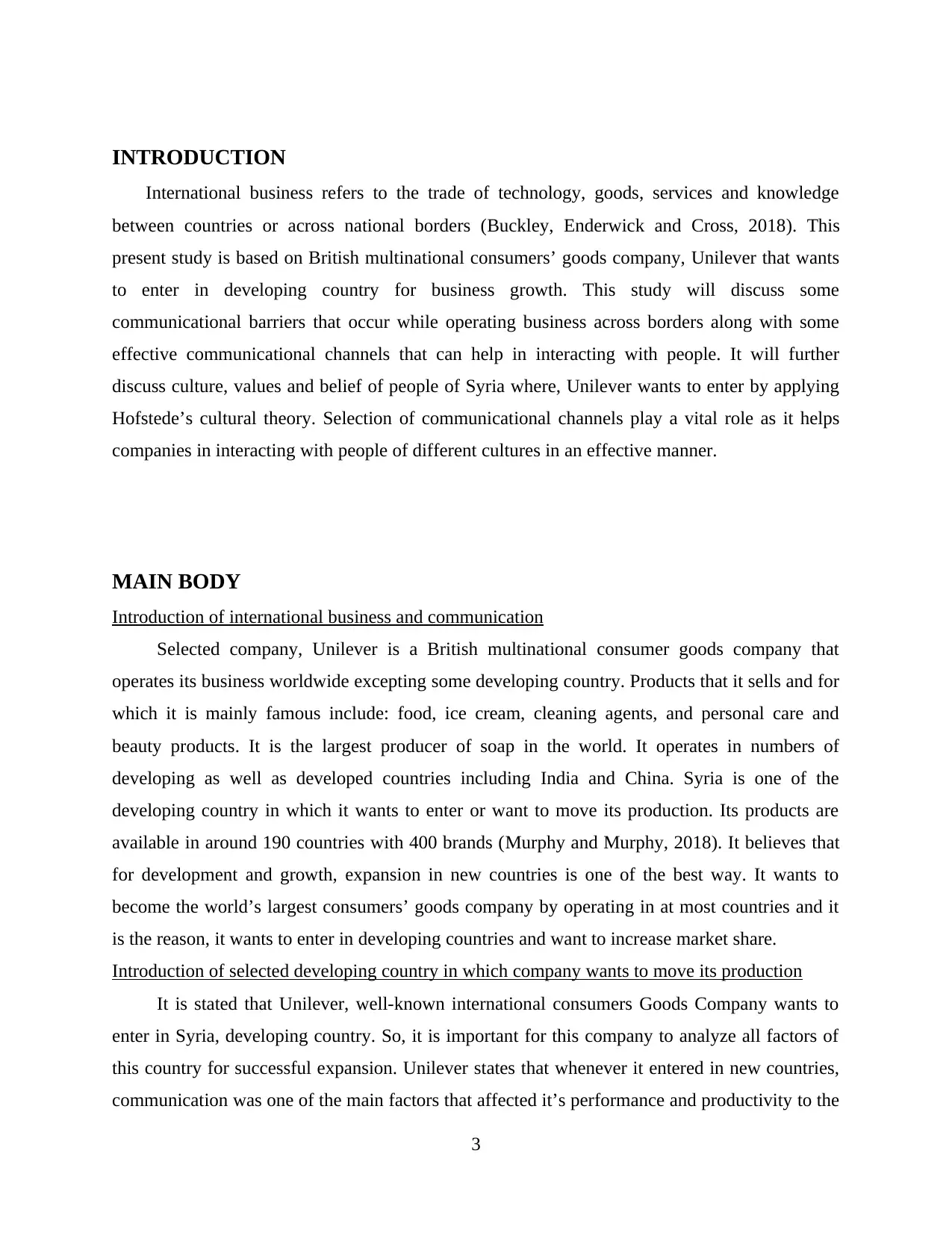
INTRODUCTION
International business refers to the trade of technology, goods, services and knowledge
between countries or across national borders (Buckley, Enderwick and Cross, 2018). This
present study is based on British multinational consumers’ goods company, Unilever that wants
to enter in developing country for business growth. This study will discuss some
communicational barriers that occur while operating business across borders along with some
effective communicational channels that can help in interacting with people. It will further
discuss culture, values and belief of people of Syria where, Unilever wants to enter by applying
Hofstede’s cultural theory. Selection of communicational channels play a vital role as it helps
companies in interacting with people of different cultures in an effective manner.
MAIN BODY
Introduction of international business and communication
Selected company, Unilever is a British multinational consumer goods company that
operates its business worldwide excepting some developing country. Products that it sells and for
which it is mainly famous include: food, ice cream, cleaning agents, and personal care and
beauty products. It is the largest producer of soap in the world. It operates in numbers of
developing as well as developed countries including India and China. Syria is one of the
developing country in which it wants to enter or want to move its production. Its products are
available in around 190 countries with 400 brands (Murphy and Murphy, 2018). It believes that
for development and growth, expansion in new countries is one of the best way. It wants to
become the world’s largest consumers’ goods company by operating in at most countries and it
is the reason, it wants to enter in developing countries and want to increase market share.
Introduction of selected developing country in which company wants to move its production
It is stated that Unilever, well-known international consumers Goods Company wants to
enter in Syria, developing country. So, it is important for this company to analyze all factors of
this country for successful expansion. Unilever states that whenever it entered in new countries,
communication was one of the main factors that affected it’s performance and productivity to the
3
International business refers to the trade of technology, goods, services and knowledge
between countries or across national borders (Buckley, Enderwick and Cross, 2018). This
present study is based on British multinational consumers’ goods company, Unilever that wants
to enter in developing country for business growth. This study will discuss some
communicational barriers that occur while operating business across borders along with some
effective communicational channels that can help in interacting with people. It will further
discuss culture, values and belief of people of Syria where, Unilever wants to enter by applying
Hofstede’s cultural theory. Selection of communicational channels play a vital role as it helps
companies in interacting with people of different cultures in an effective manner.
MAIN BODY
Introduction of international business and communication
Selected company, Unilever is a British multinational consumer goods company that
operates its business worldwide excepting some developing country. Products that it sells and for
which it is mainly famous include: food, ice cream, cleaning agents, and personal care and
beauty products. It is the largest producer of soap in the world. It operates in numbers of
developing as well as developed countries including India and China. Syria is one of the
developing country in which it wants to enter or want to move its production. Its products are
available in around 190 countries with 400 brands (Murphy and Murphy, 2018). It believes that
for development and growth, expansion in new countries is one of the best way. It wants to
become the world’s largest consumers’ goods company by operating in at most countries and it
is the reason, it wants to enter in developing countries and want to increase market share.
Introduction of selected developing country in which company wants to move its production
It is stated that Unilever, well-known international consumers Goods Company wants to
enter in Syria, developing country. So, it is important for this company to analyze all factors of
this country for successful expansion. Unilever states that whenever it entered in new countries,
communication was one of the main factors that affected it’s performance and productivity to the
3
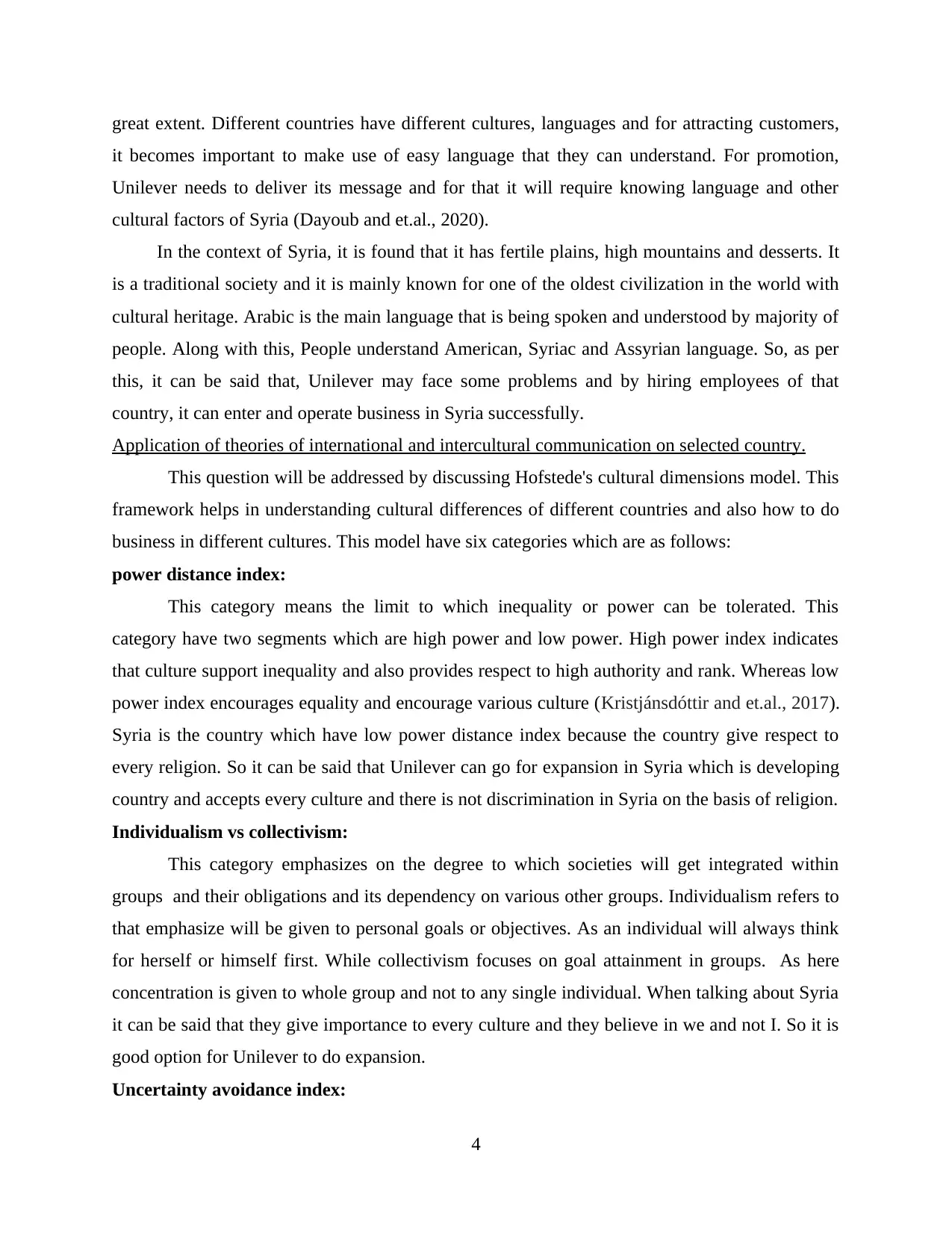
great extent. Different countries have different cultures, languages and for attracting customers,
it becomes important to make use of easy language that they can understand. For promotion,
Unilever needs to deliver its message and for that it will require knowing language and other
cultural factors of Syria (Dayoub and et.al., 2020).
In the context of Syria, it is found that it has fertile plains, high mountains and desserts. It
is a traditional society and it is mainly known for one of the oldest civilization in the world with
cultural heritage. Arabic is the main language that is being spoken and understood by majority of
people. Along with this, People understand American, Syriac and Assyrian language. So, as per
this, it can be said that, Unilever may face some problems and by hiring employees of that
country, it can enter and operate business in Syria successfully.
Application of theories of international and intercultural communication on selected country.
This question will be addressed by discussing Hofstede's cultural dimensions model. This
framework helps in understanding cultural differences of different countries and also how to do
business in different cultures. This model have six categories which are as follows:
power distance index:
This category means the limit to which inequality or power can be tolerated. This
category have two segments which are high power and low power. High power index indicates
that culture support inequality and also provides respect to high authority and rank. Whereas low
power index encourages equality and encourage various culture (Kristjánsdóttir and et.al., 2017).
Syria is the country which have low power distance index because the country give respect to
every religion. So it can be said that Unilever can go for expansion in Syria which is developing
country and accepts every culture and there is not discrimination in Syria on the basis of religion.
Individualism vs collectivism:
This category emphasizes on the degree to which societies will get integrated within
groups and their obligations and its dependency on various other groups. Individualism refers to
that emphasize will be given to personal goals or objectives. As an individual will always think
for herself or himself first. While collectivism focuses on goal attainment in groups. As here
concentration is given to whole group and not to any single individual. When talking about Syria
it can be said that they give importance to every culture and they believe in we and not I. So it is
good option for Unilever to do expansion.
Uncertainty avoidance index:
4
it becomes important to make use of easy language that they can understand. For promotion,
Unilever needs to deliver its message and for that it will require knowing language and other
cultural factors of Syria (Dayoub and et.al., 2020).
In the context of Syria, it is found that it has fertile plains, high mountains and desserts. It
is a traditional society and it is mainly known for one of the oldest civilization in the world with
cultural heritage. Arabic is the main language that is being spoken and understood by majority of
people. Along with this, People understand American, Syriac and Assyrian language. So, as per
this, it can be said that, Unilever may face some problems and by hiring employees of that
country, it can enter and operate business in Syria successfully.
Application of theories of international and intercultural communication on selected country.
This question will be addressed by discussing Hofstede's cultural dimensions model. This
framework helps in understanding cultural differences of different countries and also how to do
business in different cultures. This model have six categories which are as follows:
power distance index:
This category means the limit to which inequality or power can be tolerated. This
category have two segments which are high power and low power. High power index indicates
that culture support inequality and also provides respect to high authority and rank. Whereas low
power index encourages equality and encourage various culture (Kristjánsdóttir and et.al., 2017).
Syria is the country which have low power distance index because the country give respect to
every religion. So it can be said that Unilever can go for expansion in Syria which is developing
country and accepts every culture and there is not discrimination in Syria on the basis of religion.
Individualism vs collectivism:
This category emphasizes on the degree to which societies will get integrated within
groups and their obligations and its dependency on various other groups. Individualism refers to
that emphasize will be given to personal goals or objectives. As an individual will always think
for herself or himself first. While collectivism focuses on goal attainment in groups. As here
concentration is given to whole group and not to any single individual. When talking about Syria
it can be said that they give importance to every culture and they believe in we and not I. So it is
good option for Unilever to do expansion.
Uncertainty avoidance index:
4
Secure Best Marks with AI Grader
Need help grading? Try our AI Grader for instant feedback on your assignments.
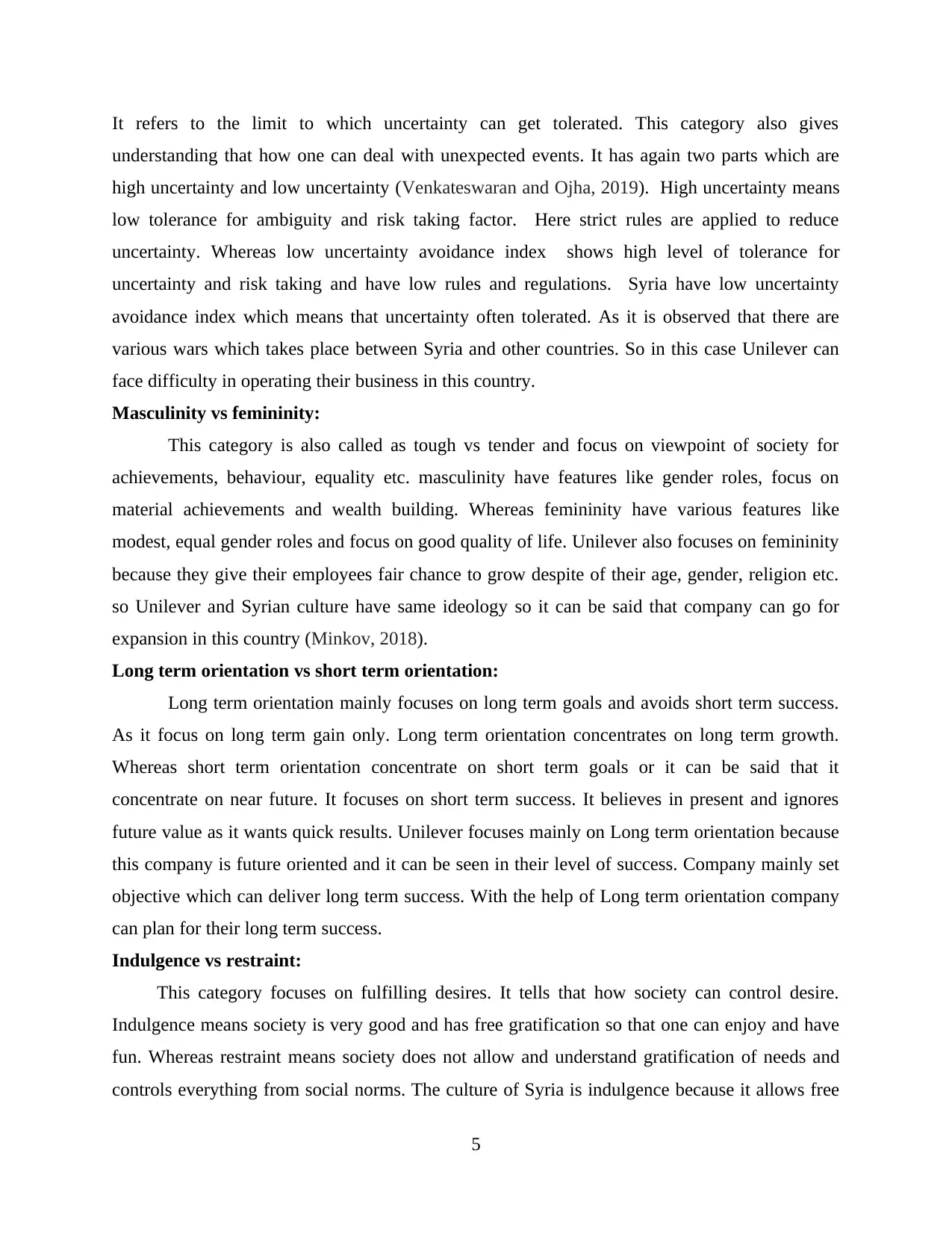
It refers to the limit to which uncertainty can get tolerated. This category also gives
understanding that how one can deal with unexpected events. It has again two parts which are
high uncertainty and low uncertainty (Venkateswaran and Ojha, 2019). High uncertainty means
low tolerance for ambiguity and risk taking factor. Here strict rules are applied to reduce
uncertainty. Whereas low uncertainty avoidance index shows high level of tolerance for
uncertainty and risk taking and have low rules and regulations. Syria have low uncertainty
avoidance index which means that uncertainty often tolerated. As it is observed that there are
various wars which takes place between Syria and other countries. So in this case Unilever can
face difficulty in operating their business in this country.
Masculinity vs femininity:
This category is also called as tough vs tender and focus on viewpoint of society for
achievements, behaviour, equality etc. masculinity have features like gender roles, focus on
material achievements and wealth building. Whereas femininity have various features like
modest, equal gender roles and focus on good quality of life. Unilever also focuses on femininity
because they give their employees fair chance to grow despite of their age, gender, religion etc.
so Unilever and Syrian culture have same ideology so it can be said that company can go for
expansion in this country (Minkov, 2018).
Long term orientation vs short term orientation:
Long term orientation mainly focuses on long term goals and avoids short term success.
As it focus on long term gain only. Long term orientation concentrates on long term growth.
Whereas short term orientation concentrate on short term goals or it can be said that it
concentrate on near future. It focuses on short term success. It believes in present and ignores
future value as it wants quick results. Unilever focuses mainly on Long term orientation because
this company is future oriented and it can be seen in their level of success. Company mainly set
objective which can deliver long term success. With the help of Long term orientation company
can plan for their long term success.
Indulgence vs restraint:
This category focuses on fulfilling desires. It tells that how society can control desire.
Indulgence means society is very good and has free gratification so that one can enjoy and have
fun. Whereas restraint means society does not allow and understand gratification of needs and
controls everything from social norms. The culture of Syria is indulgence because it allows free
5
understanding that how one can deal with unexpected events. It has again two parts which are
high uncertainty and low uncertainty (Venkateswaran and Ojha, 2019). High uncertainty means
low tolerance for ambiguity and risk taking factor. Here strict rules are applied to reduce
uncertainty. Whereas low uncertainty avoidance index shows high level of tolerance for
uncertainty and risk taking and have low rules and regulations. Syria have low uncertainty
avoidance index which means that uncertainty often tolerated. As it is observed that there are
various wars which takes place between Syria and other countries. So in this case Unilever can
face difficulty in operating their business in this country.
Masculinity vs femininity:
This category is also called as tough vs tender and focus on viewpoint of society for
achievements, behaviour, equality etc. masculinity have features like gender roles, focus on
material achievements and wealth building. Whereas femininity have various features like
modest, equal gender roles and focus on good quality of life. Unilever also focuses on femininity
because they give their employees fair chance to grow despite of their age, gender, religion etc.
so Unilever and Syrian culture have same ideology so it can be said that company can go for
expansion in this country (Minkov, 2018).
Long term orientation vs short term orientation:
Long term orientation mainly focuses on long term goals and avoids short term success.
As it focus on long term gain only. Long term orientation concentrates on long term growth.
Whereas short term orientation concentrate on short term goals or it can be said that it
concentrate on near future. It focuses on short term success. It believes in present and ignores
future value as it wants quick results. Unilever focuses mainly on Long term orientation because
this company is future oriented and it can be seen in their level of success. Company mainly set
objective which can deliver long term success. With the help of Long term orientation company
can plan for their long term success.
Indulgence vs restraint:
This category focuses on fulfilling desires. It tells that how society can control desire.
Indulgence means society is very good and has free gratification so that one can enjoy and have
fun. Whereas restraint means society does not allow and understand gratification of needs and
controls everything from social norms. The culture of Syria is indulgence because it allows free
5
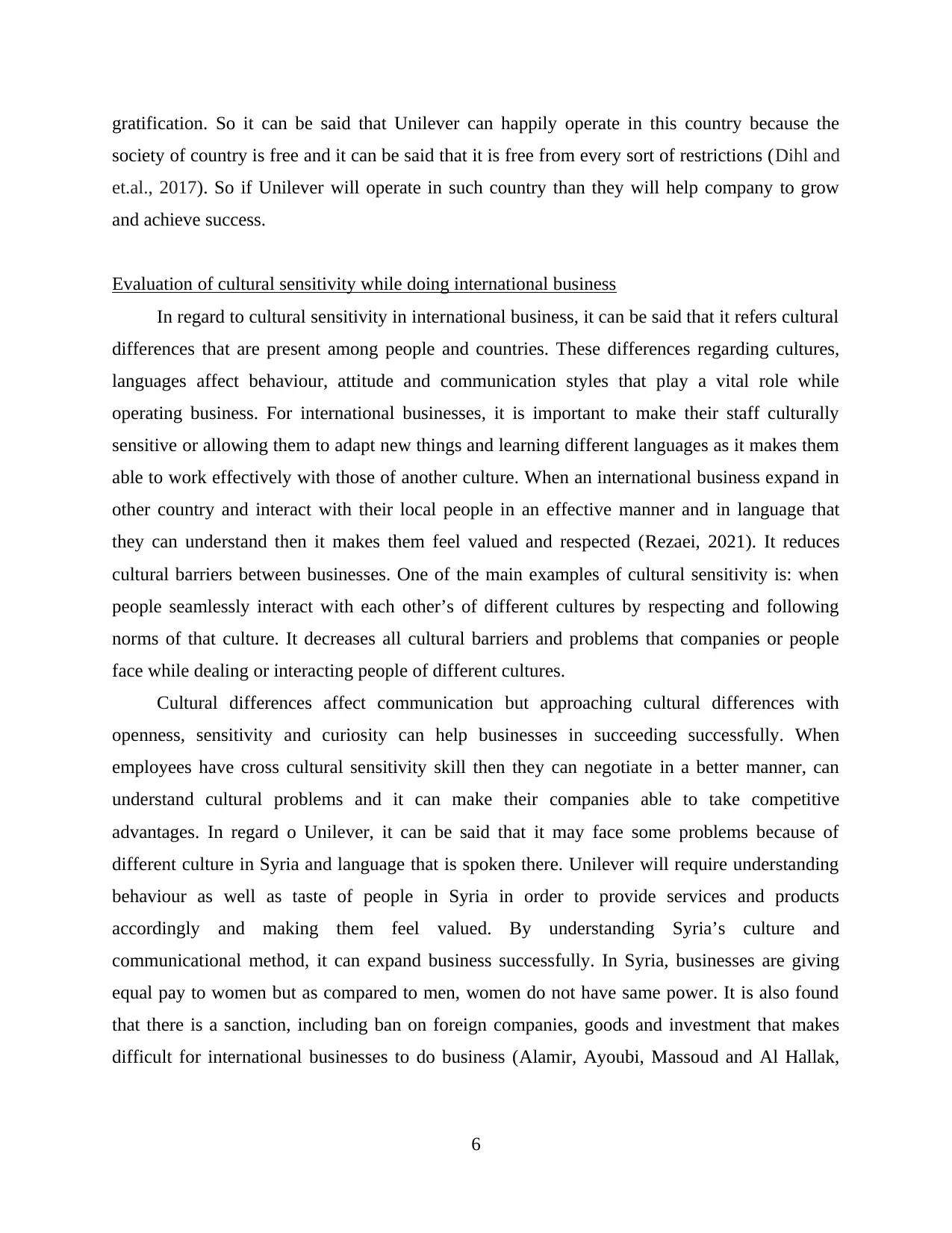
gratification. So it can be said that Unilever can happily operate in this country because the
society of country is free and it can be said that it is free from every sort of restrictions (Dihl and
et.al., 2017). So if Unilever will operate in such country than they will help company to grow
and achieve success.
Evaluation of cultural sensitivity while doing international business
In regard to cultural sensitivity in international business, it can be said that it refers cultural
differences that are present among people and countries. These differences regarding cultures,
languages affect behaviour, attitude and communication styles that play a vital role while
operating business. For international businesses, it is important to make their staff culturally
sensitive or allowing them to adapt new things and learning different languages as it makes them
able to work effectively with those of another culture. When an international business expand in
other country and interact with their local people in an effective manner and in language that
they can understand then it makes them feel valued and respected (Rezaei, 2021). It reduces
cultural barriers between businesses. One of the main examples of cultural sensitivity is: when
people seamlessly interact with each other’s of different cultures by respecting and following
norms of that culture. It decreases all cultural barriers and problems that companies or people
face while dealing or interacting people of different cultures.
Cultural differences affect communication but approaching cultural differences with
openness, sensitivity and curiosity can help businesses in succeeding successfully. When
employees have cross cultural sensitivity skill then they can negotiate in a better manner, can
understand cultural problems and it can make their companies able to take competitive
advantages. In regard o Unilever, it can be said that it may face some problems because of
different culture in Syria and language that is spoken there. Unilever will require understanding
behaviour as well as taste of people in Syria in order to provide services and products
accordingly and making them feel valued. By understanding Syria’s culture and
communicational method, it can expand business successfully. In Syria, businesses are giving
equal pay to women but as compared to men, women do not have same power. It is also found
that there is a sanction, including ban on foreign companies, goods and investment that makes
difficult for international businesses to do business (Alamir, Ayoubi, Massoud and Al Hallak,
6
society of country is free and it can be said that it is free from every sort of restrictions (Dihl and
et.al., 2017). So if Unilever will operate in such country than they will help company to grow
and achieve success.
Evaluation of cultural sensitivity while doing international business
In regard to cultural sensitivity in international business, it can be said that it refers cultural
differences that are present among people and countries. These differences regarding cultures,
languages affect behaviour, attitude and communication styles that play a vital role while
operating business. For international businesses, it is important to make their staff culturally
sensitive or allowing them to adapt new things and learning different languages as it makes them
able to work effectively with those of another culture. When an international business expand in
other country and interact with their local people in an effective manner and in language that
they can understand then it makes them feel valued and respected (Rezaei, 2021). It reduces
cultural barriers between businesses. One of the main examples of cultural sensitivity is: when
people seamlessly interact with each other’s of different cultures by respecting and following
norms of that culture. It decreases all cultural barriers and problems that companies or people
face while dealing or interacting people of different cultures.
Cultural differences affect communication but approaching cultural differences with
openness, sensitivity and curiosity can help businesses in succeeding successfully. When
employees have cross cultural sensitivity skill then they can negotiate in a better manner, can
understand cultural problems and it can make their companies able to take competitive
advantages. In regard o Unilever, it can be said that it may face some problems because of
different culture in Syria and language that is spoken there. Unilever will require understanding
behaviour as well as taste of people in Syria in order to provide services and products
accordingly and making them feel valued. By understanding Syria’s culture and
communicational method, it can expand business successfully. In Syria, businesses are giving
equal pay to women but as compared to men, women do not have same power. It is also found
that there is a sanction, including ban on foreign companies, goods and investment that makes
difficult for international businesses to do business (Alamir, Ayoubi, Massoud and Al Hallak,
6
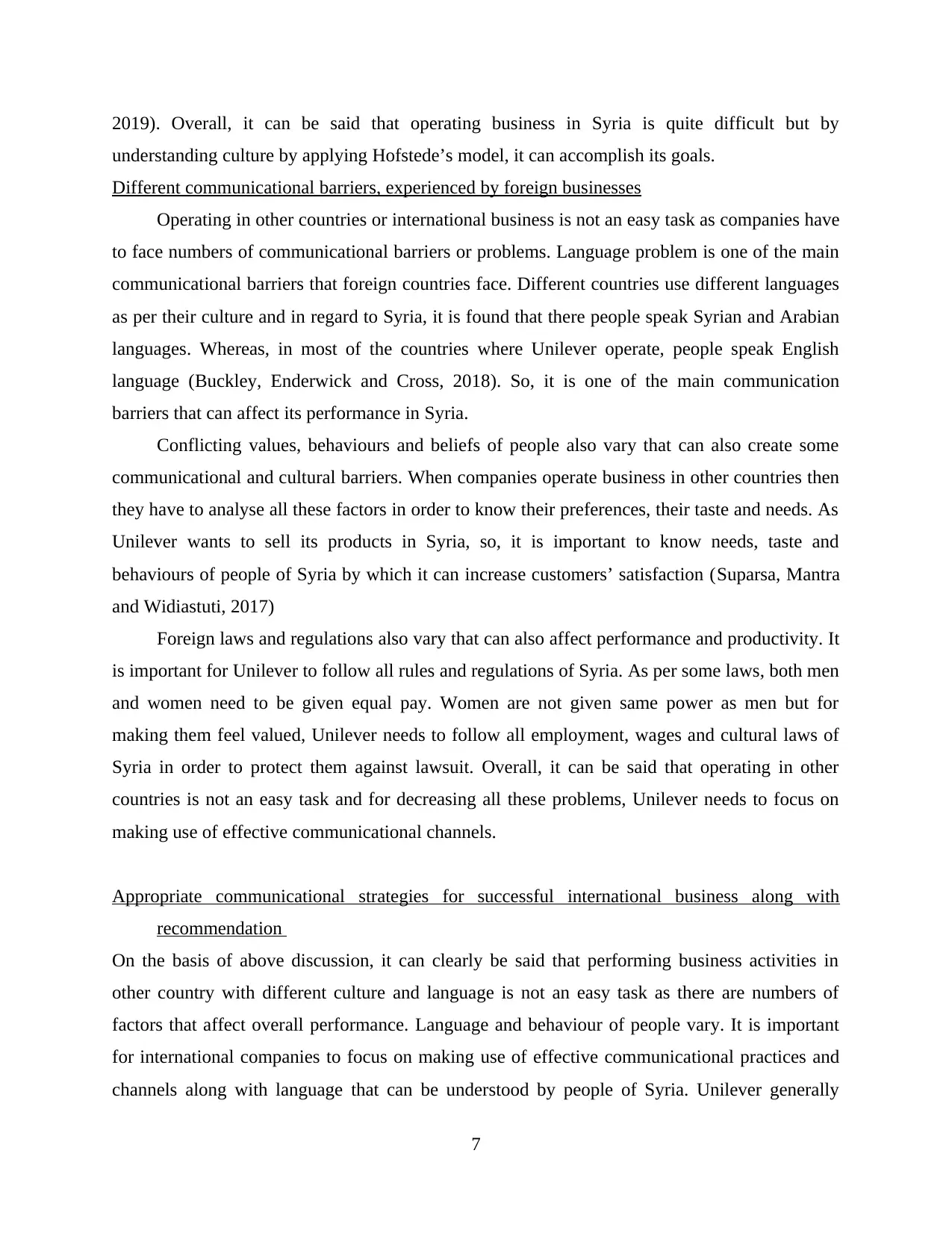
2019). Overall, it can be said that operating business in Syria is quite difficult but by
understanding culture by applying Hofstede’s model, it can accomplish its goals.
Different communicational barriers, experienced by foreign businesses
Operating in other countries or international business is not an easy task as companies have
to face numbers of communicational barriers or problems. Language problem is one of the main
communicational barriers that foreign countries face. Different countries use different languages
as per their culture and in regard to Syria, it is found that there people speak Syrian and Arabian
languages. Whereas, in most of the countries where Unilever operate, people speak English
language (Buckley, Enderwick and Cross, 2018). So, it is one of the main communication
barriers that can affect its performance in Syria.
Conflicting values, behaviours and beliefs of people also vary that can also create some
communicational and cultural barriers. When companies operate business in other countries then
they have to analyse all these factors in order to know their preferences, their taste and needs. As
Unilever wants to sell its products in Syria, so, it is important to know needs, taste and
behaviours of people of Syria by which it can increase customers’ satisfaction (Suparsa, Mantra
and Widiastuti, 2017)
Foreign laws and regulations also vary that can also affect performance and productivity. It
is important for Unilever to follow all rules and regulations of Syria. As per some laws, both men
and women need to be given equal pay. Women are not given same power as men but for
making them feel valued, Unilever needs to follow all employment, wages and cultural laws of
Syria in order to protect them against lawsuit. Overall, it can be said that operating in other
countries is not an easy task and for decreasing all these problems, Unilever needs to focus on
making use of effective communicational channels.
Appropriate communicational strategies for successful international business along with
recommendation
On the basis of above discussion, it can clearly be said that performing business activities in
other country with different culture and language is not an easy task as there are numbers of
factors that affect overall performance. Language and behaviour of people vary. It is important
for international companies to focus on making use of effective communicational practices and
channels along with language that can be understood by people of Syria. Unilever generally
7
understanding culture by applying Hofstede’s model, it can accomplish its goals.
Different communicational barriers, experienced by foreign businesses
Operating in other countries or international business is not an easy task as companies have
to face numbers of communicational barriers or problems. Language problem is one of the main
communicational barriers that foreign countries face. Different countries use different languages
as per their culture and in regard to Syria, it is found that there people speak Syrian and Arabian
languages. Whereas, in most of the countries where Unilever operate, people speak English
language (Buckley, Enderwick and Cross, 2018). So, it is one of the main communication
barriers that can affect its performance in Syria.
Conflicting values, behaviours and beliefs of people also vary that can also create some
communicational and cultural barriers. When companies operate business in other countries then
they have to analyse all these factors in order to know their preferences, their taste and needs. As
Unilever wants to sell its products in Syria, so, it is important to know needs, taste and
behaviours of people of Syria by which it can increase customers’ satisfaction (Suparsa, Mantra
and Widiastuti, 2017)
Foreign laws and regulations also vary that can also affect performance and productivity. It
is important for Unilever to follow all rules and regulations of Syria. As per some laws, both men
and women need to be given equal pay. Women are not given same power as men but for
making them feel valued, Unilever needs to follow all employment, wages and cultural laws of
Syria in order to protect them against lawsuit. Overall, it can be said that operating in other
countries is not an easy task and for decreasing all these problems, Unilever needs to focus on
making use of effective communicational channels.
Appropriate communicational strategies for successful international business along with
recommendation
On the basis of above discussion, it can clearly be said that performing business activities in
other country with different culture and language is not an easy task as there are numbers of
factors that affect overall performance. Language and behaviour of people vary. It is important
for international companies to focus on making use of effective communicational practices and
channels along with language that can be understood by people of Syria. Unilever generally
7
Paraphrase This Document
Need a fresh take? Get an instant paraphrase of this document with our AI Paraphraser
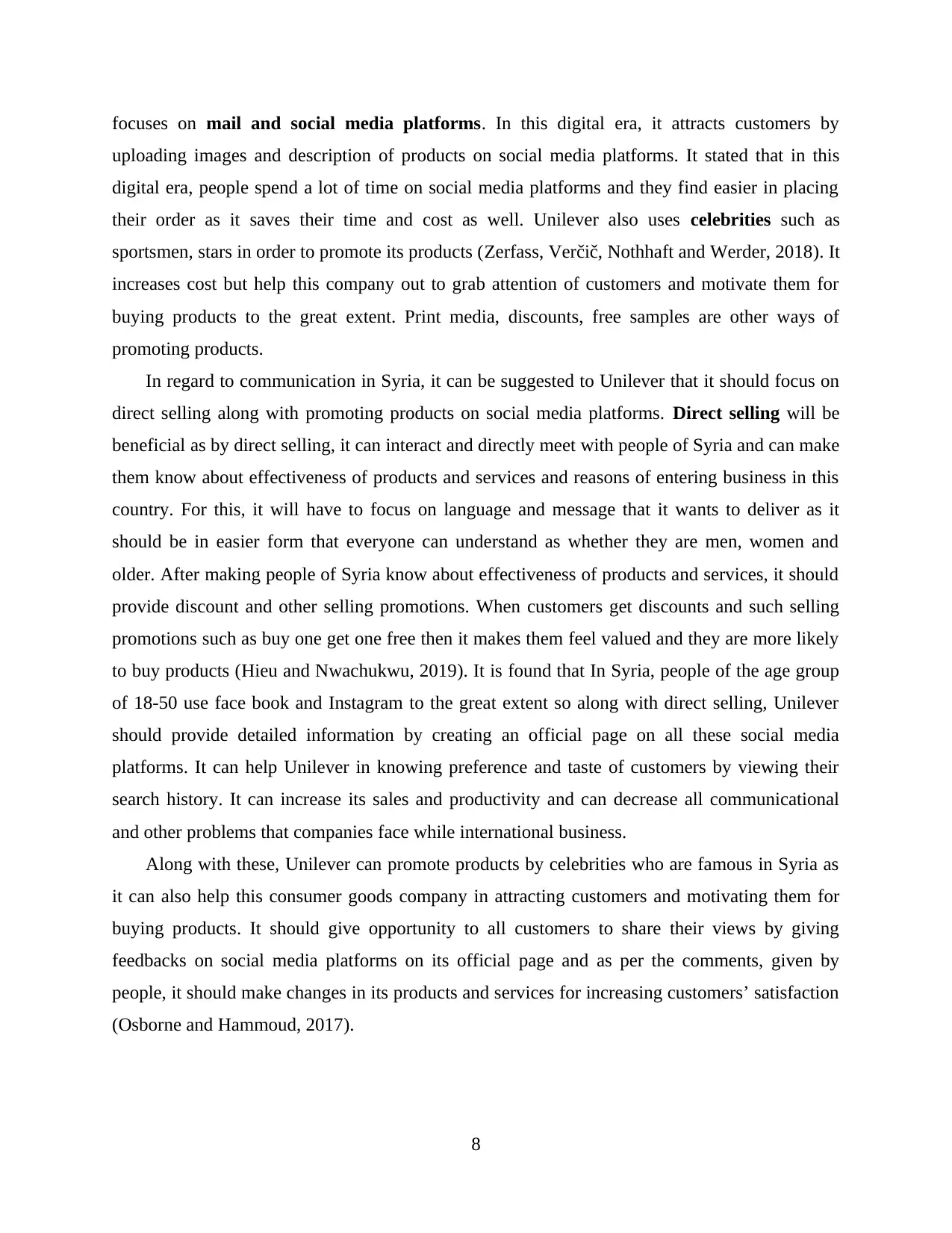
focuses on mail and social media platforms. In this digital era, it attracts customers by
uploading images and description of products on social media platforms. It stated that in this
digital era, people spend a lot of time on social media platforms and they find easier in placing
their order as it saves their time and cost as well. Unilever also uses celebrities such as
sportsmen, stars in order to promote its products (Zerfass, Verčič, Nothhaft and Werder, 2018). It
increases cost but help this company out to grab attention of customers and motivate them for
buying products to the great extent. Print media, discounts, free samples are other ways of
promoting products.
In regard to communication in Syria, it can be suggested to Unilever that it should focus on
direct selling along with promoting products on social media platforms. Direct selling will be
beneficial as by direct selling, it can interact and directly meet with people of Syria and can make
them know about effectiveness of products and services and reasons of entering business in this
country. For this, it will have to focus on language and message that it wants to deliver as it
should be in easier form that everyone can understand as whether they are men, women and
older. After making people of Syria know about effectiveness of products and services, it should
provide discount and other selling promotions. When customers get discounts and such selling
promotions such as buy one get one free then it makes them feel valued and they are more likely
to buy products (Hieu and Nwachukwu, 2019). It is found that In Syria, people of the age group
of 18-50 use face book and Instagram to the great extent so along with direct selling, Unilever
should provide detailed information by creating an official page on all these social media
platforms. It can help Unilever in knowing preference and taste of customers by viewing their
search history. It can increase its sales and productivity and can decrease all communicational
and other problems that companies face while international business.
Along with these, Unilever can promote products by celebrities who are famous in Syria as
it can also help this consumer goods company in attracting customers and motivating them for
buying products. It should give opportunity to all customers to share their views by giving
feedbacks on social media platforms on its official page and as per the comments, given by
people, it should make changes in its products and services for increasing customers’ satisfaction
(Osborne and Hammoud, 2017).
8
uploading images and description of products on social media platforms. It stated that in this
digital era, people spend a lot of time on social media platforms and they find easier in placing
their order as it saves their time and cost as well. Unilever also uses celebrities such as
sportsmen, stars in order to promote its products (Zerfass, Verčič, Nothhaft and Werder, 2018). It
increases cost but help this company out to grab attention of customers and motivate them for
buying products to the great extent. Print media, discounts, free samples are other ways of
promoting products.
In regard to communication in Syria, it can be suggested to Unilever that it should focus on
direct selling along with promoting products on social media platforms. Direct selling will be
beneficial as by direct selling, it can interact and directly meet with people of Syria and can make
them know about effectiveness of products and services and reasons of entering business in this
country. For this, it will have to focus on language and message that it wants to deliver as it
should be in easier form that everyone can understand as whether they are men, women and
older. After making people of Syria know about effectiveness of products and services, it should
provide discount and other selling promotions. When customers get discounts and such selling
promotions such as buy one get one free then it makes them feel valued and they are more likely
to buy products (Hieu and Nwachukwu, 2019). It is found that In Syria, people of the age group
of 18-50 use face book and Instagram to the great extent so along with direct selling, Unilever
should provide detailed information by creating an official page on all these social media
platforms. It can help Unilever in knowing preference and taste of customers by viewing their
search history. It can increase its sales and productivity and can decrease all communicational
and other problems that companies face while international business.
Along with these, Unilever can promote products by celebrities who are famous in Syria as
it can also help this consumer goods company in attracting customers and motivating them for
buying products. It should give opportunity to all customers to share their views by giving
feedbacks on social media platforms on its official page and as per the comments, given by
people, it should make changes in its products and services for increasing customers’ satisfaction
(Osborne and Hammoud, 2017).
8
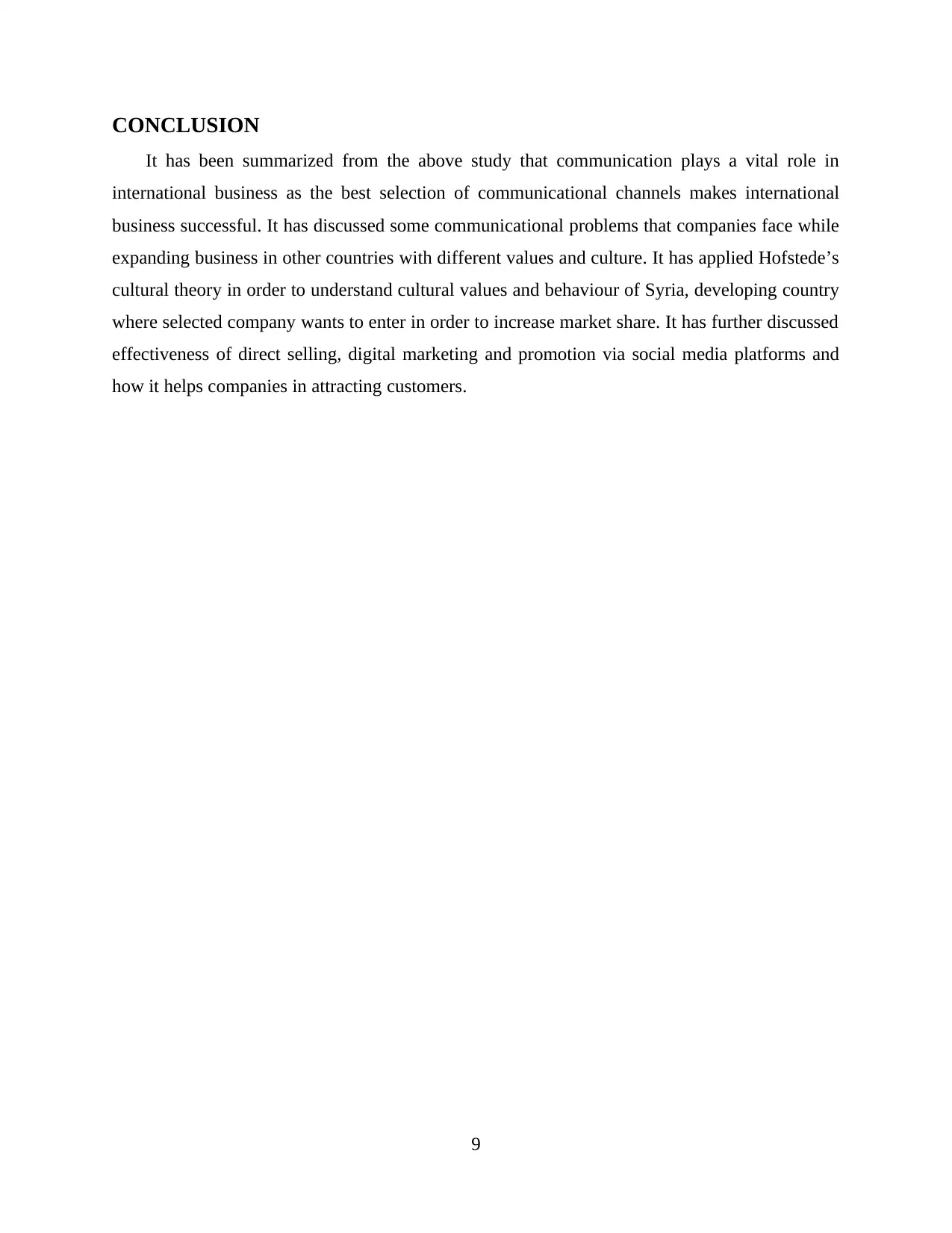
CONCLUSION
It has been summarized from the above study that communication plays a vital role in
international business as the best selection of communicational channels makes international
business successful. It has discussed some communicational problems that companies face while
expanding business in other countries with different values and culture. It has applied Hofstede’s
cultural theory in order to understand cultural values and behaviour of Syria, developing country
where selected company wants to enter in order to increase market share. It has further discussed
effectiveness of direct selling, digital marketing and promotion via social media platforms and
how it helps companies in attracting customers.
9
It has been summarized from the above study that communication plays a vital role in
international business as the best selection of communicational channels makes international
business successful. It has discussed some communicational problems that companies face while
expanding business in other countries with different values and culture. It has applied Hofstede’s
cultural theory in order to understand cultural values and behaviour of Syria, developing country
where selected company wants to enter in order to increase market share. It has further discussed
effectiveness of direct selling, digital marketing and promotion via social media platforms and
how it helps companies in attracting customers.
9
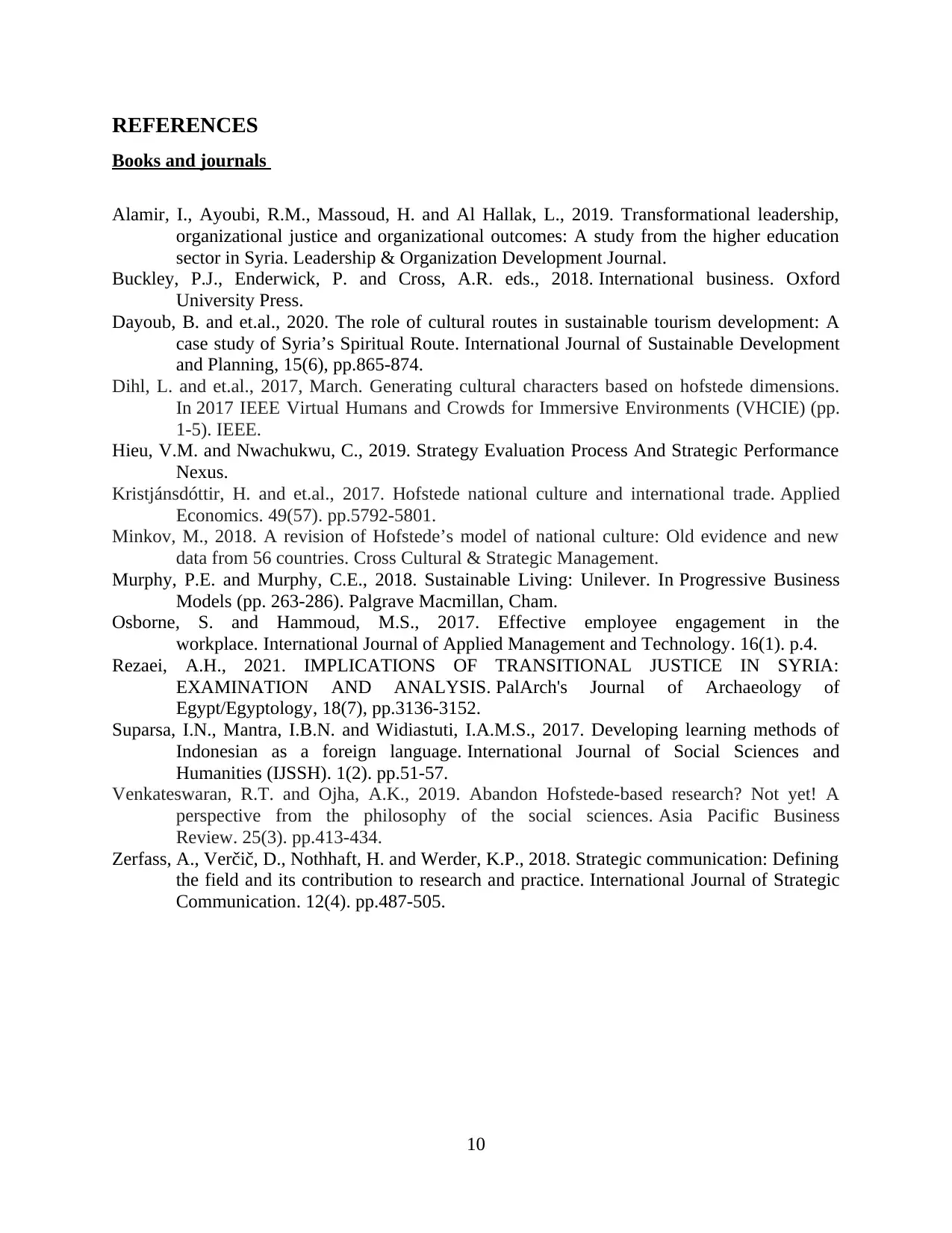
REFERENCES
Books and journals
Alamir, I., Ayoubi, R.M., Massoud, H. and Al Hallak, L., 2019. Transformational leadership,
organizational justice and organizational outcomes: A study from the higher education
sector in Syria. Leadership & Organization Development Journal.
Buckley, P.J., Enderwick, P. and Cross, A.R. eds., 2018. International business. Oxford
University Press.
Dayoub, B. and et.al., 2020. The role of cultural routes in sustainable tourism development: A
case study of Syria’s Spiritual Route. International Journal of Sustainable Development
and Planning, 15(6), pp.865-874.
Dihl, L. and et.al., 2017, March. Generating cultural characters based on hofstede dimensions.
In 2017 IEEE Virtual Humans and Crowds for Immersive Environments (VHCIE) (pp.
1-5). IEEE.
Hieu, V.M. and Nwachukwu, C., 2019. Strategy Evaluation Process And Strategic Performance
Nexus.
Kristjánsdóttir, H. and et.al., 2017. Hofstede national culture and international trade. Applied
Economics. 49(57). pp.5792-5801.
Minkov, M., 2018. A revision of Hofstede’s model of national culture: Old evidence and new
data from 56 countries. Cross Cultural & Strategic Management.
Murphy, P.E. and Murphy, C.E., 2018. Sustainable Living: Unilever. In Progressive Business
Models (pp. 263-286). Palgrave Macmillan, Cham.
Osborne, S. and Hammoud, M.S., 2017. Effective employee engagement in the
workplace. International Journal of Applied Management and Technology. 16(1). p.4.
Rezaei, A.H., 2021. IMPLICATIONS OF TRANSITIONAL JUSTICE IN SYRIA:
EXAMINATION AND ANALYSIS. PalArch's Journal of Archaeology of
Egypt/Egyptology, 18(7), pp.3136-3152.
Suparsa, I.N., Mantra, I.B.N. and Widiastuti, I.A.M.S., 2017. Developing learning methods of
Indonesian as a foreign language. International Journal of Social Sciences and
Humanities (IJSSH). 1(2). pp.51-57.
Venkateswaran, R.T. and Ojha, A.K., 2019. Abandon Hofstede-based research? Not yet! A
perspective from the philosophy of the social sciences. Asia Pacific Business
Review. 25(3). pp.413-434.
Zerfass, A., Verčič, D., Nothhaft, H. and Werder, K.P., 2018. Strategic communication: Defining
the field and its contribution to research and practice. International Journal of Strategic
Communication. 12(4). pp.487-505.
10
Books and journals
Alamir, I., Ayoubi, R.M., Massoud, H. and Al Hallak, L., 2019. Transformational leadership,
organizational justice and organizational outcomes: A study from the higher education
sector in Syria. Leadership & Organization Development Journal.
Buckley, P.J., Enderwick, P. and Cross, A.R. eds., 2018. International business. Oxford
University Press.
Dayoub, B. and et.al., 2020. The role of cultural routes in sustainable tourism development: A
case study of Syria’s Spiritual Route. International Journal of Sustainable Development
and Planning, 15(6), pp.865-874.
Dihl, L. and et.al., 2017, March. Generating cultural characters based on hofstede dimensions.
In 2017 IEEE Virtual Humans and Crowds for Immersive Environments (VHCIE) (pp.
1-5). IEEE.
Hieu, V.M. and Nwachukwu, C., 2019. Strategy Evaluation Process And Strategic Performance
Nexus.
Kristjánsdóttir, H. and et.al., 2017. Hofstede national culture and international trade. Applied
Economics. 49(57). pp.5792-5801.
Minkov, M., 2018. A revision of Hofstede’s model of national culture: Old evidence and new
data from 56 countries. Cross Cultural & Strategic Management.
Murphy, P.E. and Murphy, C.E., 2018. Sustainable Living: Unilever. In Progressive Business
Models (pp. 263-286). Palgrave Macmillan, Cham.
Osborne, S. and Hammoud, M.S., 2017. Effective employee engagement in the
workplace. International Journal of Applied Management and Technology. 16(1). p.4.
Rezaei, A.H., 2021. IMPLICATIONS OF TRANSITIONAL JUSTICE IN SYRIA:
EXAMINATION AND ANALYSIS. PalArch's Journal of Archaeology of
Egypt/Egyptology, 18(7), pp.3136-3152.
Suparsa, I.N., Mantra, I.B.N. and Widiastuti, I.A.M.S., 2017. Developing learning methods of
Indonesian as a foreign language. International Journal of Social Sciences and
Humanities (IJSSH). 1(2). pp.51-57.
Venkateswaran, R.T. and Ojha, A.K., 2019. Abandon Hofstede-based research? Not yet! A
perspective from the philosophy of the social sciences. Asia Pacific Business
Review. 25(3). pp.413-434.
Zerfass, A., Verčič, D., Nothhaft, H. and Werder, K.P., 2018. Strategic communication: Defining
the field and its contribution to research and practice. International Journal of Strategic
Communication. 12(4). pp.487-505.
10
Secure Best Marks with AI Grader
Need help grading? Try our AI Grader for instant feedback on your assignments.

11
1 out of 11
Related Documents
Your All-in-One AI-Powered Toolkit for Academic Success.
+13062052269
info@desklib.com
Available 24*7 on WhatsApp / Email
![[object Object]](/_next/static/media/star-bottom.7253800d.svg)
Unlock your academic potential
© 2024 | Zucol Services PVT LTD | All rights reserved.




